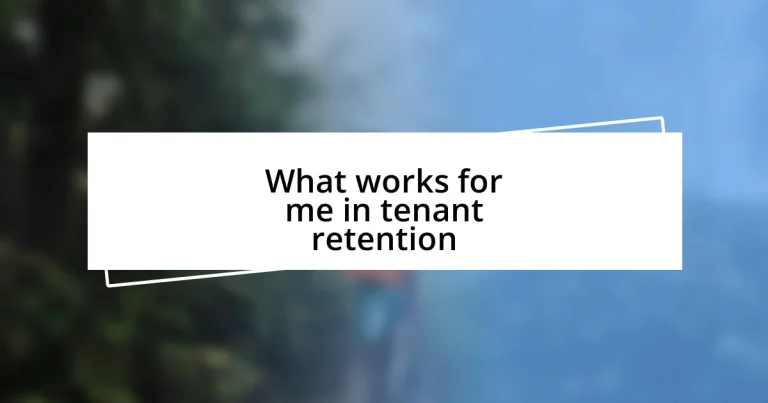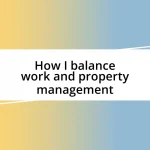Key takeaways:
- Strong communication and regular check-ins build trust and rapport with tenants, enhancing retention.
- Community engagement through events and feedback opportunities fosters connections and makes tenants feel valued.
- Timely maintenance and competitive lease terms encourage loyalty, ensuring tenants feel secure and appreciated in their living environment.
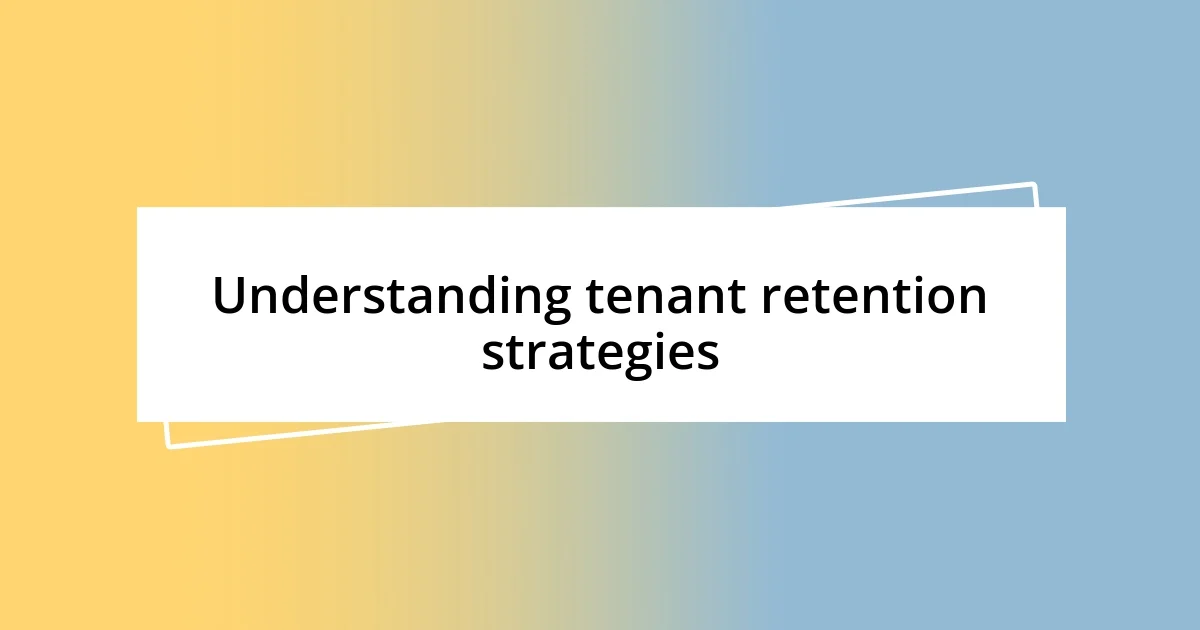
Understanding tenant retention strategies
When I think about tenant retention strategies, I often reflect on the simple yet profound impact of communication. In my experience, regular check-ins with tenants can make all the difference; it’s amazing how a quick call or message can reveal issues before they escalate. Have you ever noticed how a little attention goes a long way in building trust and rapport?
Another strategy that has worked wonders for me is creating a welcoming community atmosphere. I remember hosting a casual barbecue for my tenants a few years ago, which not only fostered connections but also made them feel more at home. Isn’t it fascinating how shared experiences can deepen a sense of belonging?
Lastly, I’ve found that being responsive to maintenance requests is vital in retaining tenants. Once, a tenant reached out to me about a leaky faucet. I rushed over that same day to fix it, and the gratitude in their voice reminded me just how important it is to show that we care. Don’t you think that taking prompt action can transform a fleeting concern into lasting loyalty?
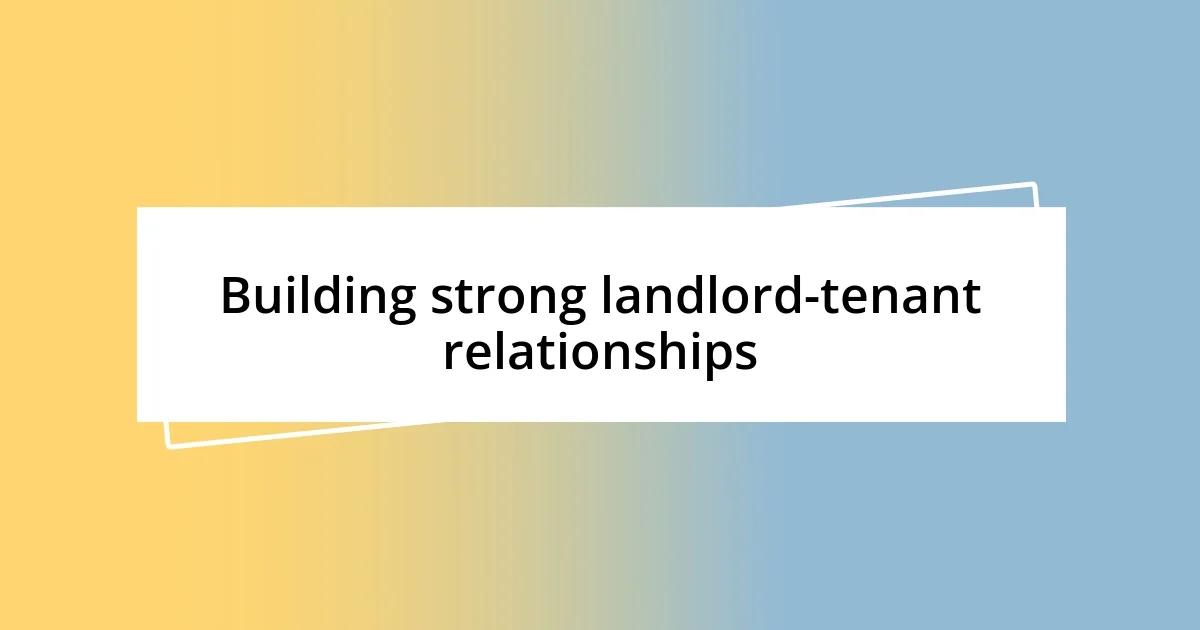
Building strong landlord-tenant relationships
Building strong relationships with tenants is, in my view, at the heart of successful property management. I remember a time when I arranged a small holiday gathering for my tenants. The atmosphere was filled with laughter, and it helped everyone connect beyond just landlord-tenant interactions. It’s moments like these that remind me how important it is to treat tenants like part of a community, which in turn fosters loyalty.
Here are some key approaches that can strengthen these relationships:
- Be Approachable: Always let tenants know they can contact you with concerns or questions. Being seen as accessible goes a long way in building trust.
- Listen Actively: When tenants express their needs or concerns, make sure to listen and validate their feelings. This shows them you genuinely care.
- Personalized Touch: A small gesture like a handwritten note for special occasions can leave a lasting impression, reinforcing that you see tenants as individuals, not just contracts.
- Feedback Opportunities: Create opportunities for tenants to provide feedback on their experience. Whether through surveys or informal chats, it shows you value their opinions.
- Consistent Communication: Regular updates and check-ins, just to ask how things are going, can keep the lines of communication open and positive.
Each of these elements has played a role in nurturing lasting relationships that enhance tenant retention, and I wholeheartedly believe they create a more immersive living experience.

Offering competitive lease terms
Offering competitive lease terms can significantly impact tenant retention. From my experience, flexibility is key. For instance, I once had a tenant who was hesitant to renew their lease due to a temporary financial setback. I offered them a month-to-month agreement with a small rent incentive, which not only relieved their worries but ultimately led to them staying for another year. Have you ever considered how small alterations in lease terms could create a win-win situation for both parties?
Additionally, adjusting lease terms to match market rates can keep tenants happy and engaged. Early on, I learned the hard way that overpricing can lead to unnecessary vacancies. I once compared my lease terms with similar properties in the neighborhood and realized I was charging significantly more. After adjusting my rates, I saw an increase in tenant interest. It’s fascinating how staying competitive not only attracts new tenants but also reassures current ones that they’re getting value for their investment.
Lastly, offering incentives such as renewal bonuses or discounts for referrals encourages a sense of loyalty. I once implemented a referral discount after one of my long-term tenants recommended a friend. This not only helped fill my vacancy quickly but also made my tenant feel valued, reinforcing their commitment to my property. Isn’t it amazing how competitive lease terms can foster a community where tenants feel appreciated?
| Competitive Lease Term | Impact |
|---|---|
| Flexibility in Lease Length | Increases tenant comfort and retention |
| Market Rate Adjustments | Prevents vacancies and maintains competitiveness |
| Incentives for Renewals/Referrals | Encourages loyalty and tenant engagement |
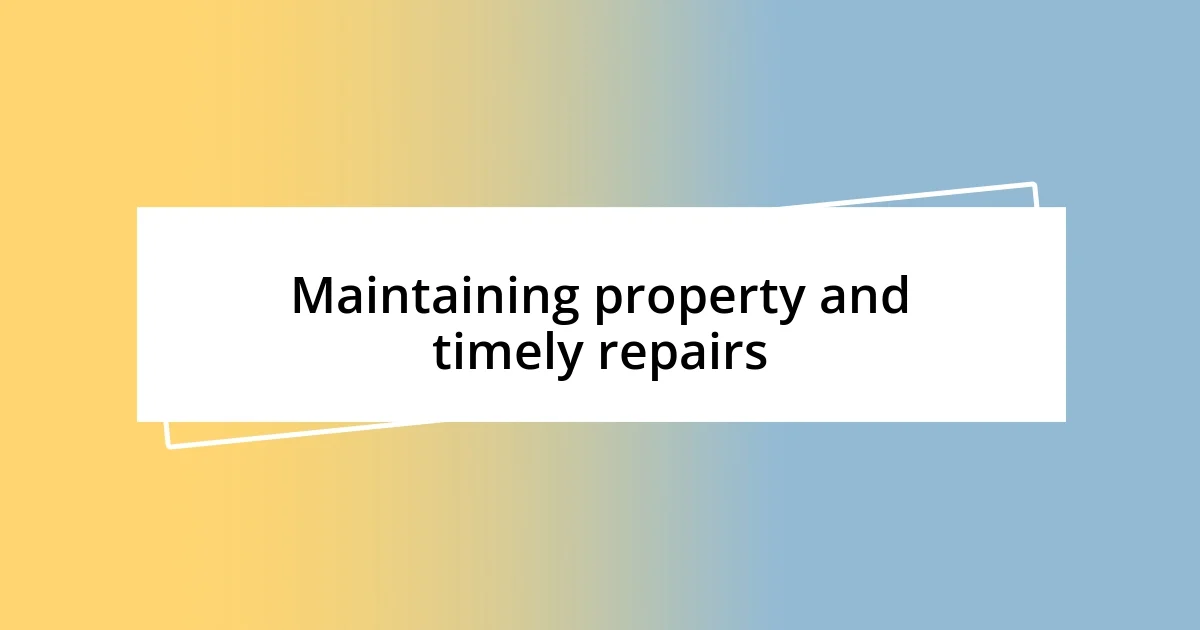
Maintaining property and timely repairs
Maintaining property and ensuring timely repairs are crucial aspects of tenant retention that I can personally attest to. In my early days as a landlord, I faced a situation where a minor plumbing issue escalated because it went unattended for too long. That tenant moved out unexpectedly, leaving me searching for a replacement. It’s a hard lesson, but it solidified my belief that prioritizing repairs not only keeps the property in good shape but also signals to tenants that their comfort matters.
When repairs are handled swiftly, it builds trust. Once, a tenant called about a heating issue in the middle of winter. I immediately arranged for a technician, ensuring the tenant’s home was warm that same day. The gratitude expressed in their voice was a reminder that a small act had a big impact. I often ask myself, how would I feel if I were in their shoes? I believe addressing issues quickly cultivates a positive living experience that encourages tenants to stay longer.
Moreover, routine maintenance can prevent larger problems down the road, saving time and money. I implemented a seasonal checklist to keep track of things like gutter cleaning and HVAC inspections. It’s become second nature to me, and I’ve noticed a significant drop in emergency repair calls. Have you ever thought about how proactive maintenance could transform your landlord experience? It really does create a more harmonious atmosphere and enables tenants to feel secure in their living environment.
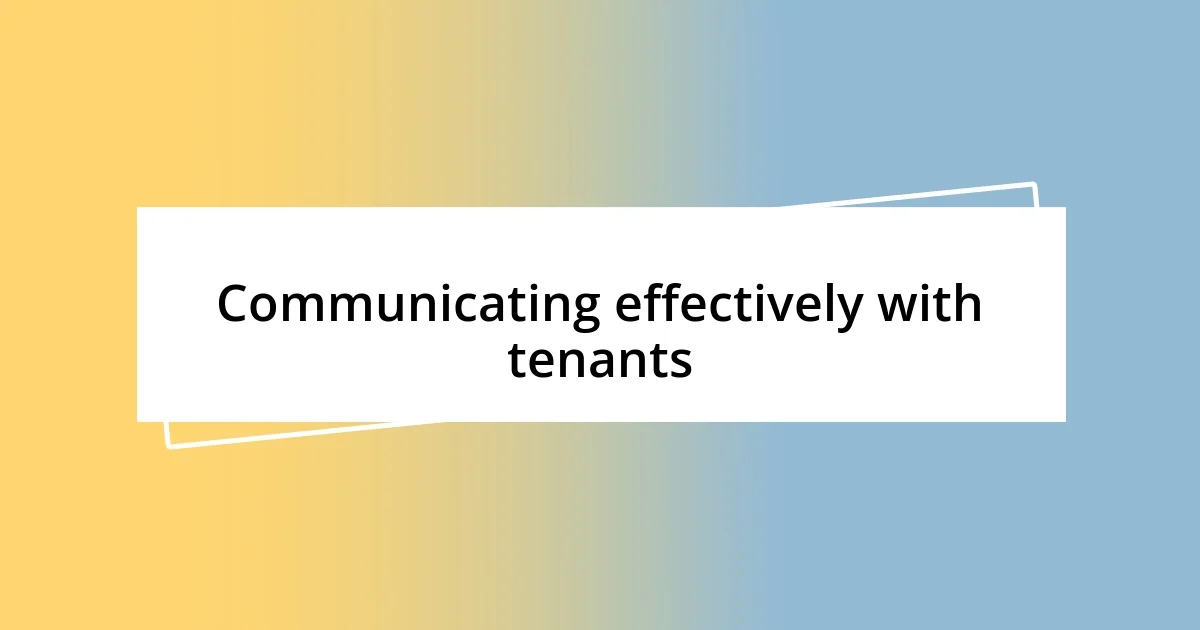
Communicating effectively with tenants
Effective communication with tenants is an ongoing commitment that I’ve found vital to fostering a positive relationship. I remember one instance when a tenant reached out to express concerns about the noise levels from neighbors. Instead of brushing it off or postponing the discussion, I made it a priority to meet with them face-to-face. That simple act of listening not only alleviated their worries but also strengthened the bond of trust between us. Have you ever noticed how a quick conversation can clear up misunderstandings?
It’s not just about being available; it’s also about being approachable. I make it a point to keep communication lines open through various channels—whether it’s a phone call, email, or even a quick text. Once, a tenant texted me about a pet-related query just before signing their lease. I replied promptly, and that responsiveness contributed to their decision to choose my property over others. I can’t stress enough how responsiveness fosters a sense of community and safety.
Regular updates are another key component of effective communication. In my experience, sending monthly newsletters with community news or reminders about upcoming maintenance schedules keeps everyone informed and engaged. I’ve found that when tenants feel informed, they show greater respect and consideration for the property and each other. It’s fascinating how something as simple as regular updates can cultivate a stronger community atmosphere—what strategies have you considered to keep your tenants in the loop?
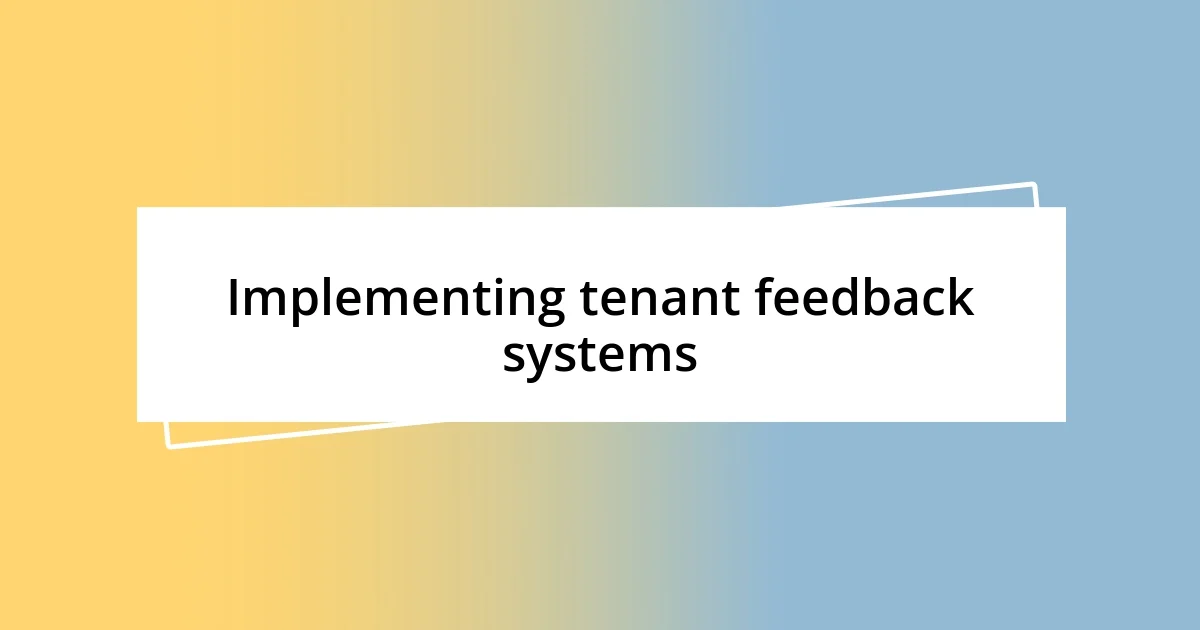
Implementing tenant feedback systems
Implementing tenant feedback systems has been a game-changer for me in understanding what my tenants truly need. I once introduced a simple online survey after a lease renewal to gather insights directly from tenants. The feedback revealed that some desired quicker access to local services, which prompted me to create a community resource guide. It was satisfying to see that a small initiative could lead to stronger community ties, making my tenants feel more at home.
I also find that personalizing feedback sessions can enhance the relationship further. I trust my gut and occasionally host informal coffee chats where tenants can freely share their thoughts. It’s incredible how such casual conversations can uncover hidden issues. During one chat, a tenant expressed wanting more greenery around the property, which led me to invest in landscaping that beautified the space while making tenants feel like their voices mattered. Don’t you think that creating an inviting space can make a significant difference in retention?
Incorporating tenant feedback doesn’t have to be a daunting process. I’ve learned to ask the right questions—open-ended ones that encourage dialogue rather than just yes-or-no answers. For instance, asking “What would make your living experience better?” has often ignited meaningful conversations. The warmth I receive in return, when tenants feel heard and valued, reinforces my belief in the importance of feedback systems. How can you tap into the wealth of knowledge your tenants possess to enhance their living experience?

Providing community engagement opportunities
Creating community engagement opportunities is something I genuinely value in my role as a property manager. I recall the joy of organizing a summer barbecue for tenants. Not only did it allow everyone to unwind, but it also sparked connections that weren’t there before. Sometimes, I wonder how often a simple event can transform acquaintances into friends. When tenants know their neighbors, they’re more likely to stay and contribute to a positive community vibe.
I’ve also found that offering workshops—be it cooking classes or DIY home improvement sessions—can foster a sense of belonging. One time, I hosted a painting night, and it was heartwarming to watch tenants bond over shared creative endeavors. The laughter, the paint-stained hands—it’s an experience that stuck with me. Isn’t it fascinating how shared activities can create lasting memories? These moments encourage tenants to invest emotionally in their surroundings.
Additionally, I’ve noticed that involving tenants in decision-making about community events fosters ownership. When I asked for input regarding what they’d like to see for the next seasonal event, I was amazed at the enthusiasm. Tenants suggested a movie night, which we turned into a monthly tradition. Seeing them light up when their ideas came to life reminded me how important it is to empower individuals within the community. How do you invite your tenants to contribute to the community fabric?












